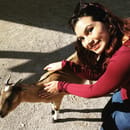Trigger Warning: talk of eating disorders may be sensitive for some audiences.
I think that in this day and age, “brave” is an overused adjective that has often been employed to romanticize situations and people who are a multitude more than just simply “brave.” Yet when I see so many folks speaking their truths and sharing their experiences in various platforms, especially with regard to NEDA week, I have to admit the first words I think of is, indeed, “brave.” Vulnerability and transparency about individual and collective experiences looks, feels and plays out different for all. I applaud everyone who uses their words and art to move forward for a society where support for every body and mind is a reality. I also want to take a moment to recognize everyone who is seeking out clarity to their experiences and allies who aspire to be a means of support.
I really was not familiar with the term “ally” for quite some time. All I know is that from the time I was in middle school, all of a sudden I started to become someone who my friends and family would come to, telling me about issues they were struggling with, particularly with their mental wellness. I certainly was never equipped to handle a friend telling me that they were self-harming when I was 12 and I did not really know what that was, let alone what to say. I didn’t know what to do when someone would call or text me during an anxiety attack.
Answer. Stay calm, redirect the senses, be a friend and be patient.
Is that what a professional would do? Middle school Maria really had no clue how to handle difficult situations other than to listen, to be a friend, and try to be positive.
Somewhere along those lines, then, people associated me with being an ally, and I was enthralled to find via Pinterest all the ways I matched up with the description of an empath. An empath is someone who can draw pieces of their own experience that might not match someone else’s exactly, but is still able to feel sympathy for them. Yet empathy and sympathy, while quite important, are not equal to shared similar experience. And that idea set in place, for both my friends and myself, that the horizon of my empathy had its limits, that I was someone who could do their best to give support, but never would really understand.
Something about this notion never sat quite right with me, however. I also learned quickly that an issue of our world currently is when people attempt to enter a space that isn’t quite their own with the intention of overpowering those who do own or populate that space. To commandeer a story that isn’t really yours for a benefit which is solely to you. This appropriation does not always recognize itself, nor does it always have malicious intent, yet in a time where voices which have long been silenced are having space to speak up, other voices need not be the loudest. They do need to speak, because everyone has a right to, someone’s own narrative can not be divorced from them by another, but timing really is everything.
Considering this, I took my place. A confidant, an ally. That was all. That, as you may have guessed from my laborious drawing out of abstract concepts, was not entirely being true to myself. Because when I had the privilege to listen to friends and family recently diagnosed with depression, I had a hard time distinguishing whether my empathy came from “being a good person” or whether it came deep within, from memories of numbness for indistinguishable amounts of time when I was younger. Did the way a friend spoke about their experience understanding their own depression echo so truly with me because I was “intently listening,” or because it sounded eerily familiar of poems, stories, and songs I’d buried away in confusion of my own mind at 11? When I was a freshman in high school and I had a string of hyperventilating episodes in a parked car in Target, at the bathroom at school, what was that? The isolation of those few events couldn’t be compared to the severity of panic attacks I knew some of my friends had been having for years. But was it my brightest idea to dismiss these events entirely?
And then came ED. Everytime NEDA week rolls around, or from a variety of platforms, I am always so impressed with the vulnerability folks exercise with sharing their stories. As mentioned before, they are truly “brave,” even if that word has lost its meaning. Buried beneath those initial emotions I feel when reading anyone’s experience and recovery with ED, is a hint of relief. Relief that I was not the only person whose thought process revolved around food so much that I hated it, yet couldn’t stop thinking about it.
I used to play games with numbers. What was the time on the analog clock in my 7th grade US History class when I heard my stomach rumble for the first time. How many times could I hear it growl before everyone rushed in the hallways to lunch. How many fast food restaurant menu calorie counts could I memorize, how many times could I glance at my body in the reflection of the display case before the person I was walking with would say something? Beyond numbers, it was a feeling. I trained myself to associate hunger with “winning,” and that light headed, dizziness with a euphoria of “making progress” towards a goal that I could never attain. Every summer since my brother and I were little, when school let out in June, my grandparents would take our height and weight so we could see how we had grown since last year. A tradition with good intentions, until the year I shut the door to my grandmother’s bedroom and kept doing crunches on the floor until it was time to pull out the scale, until she called me from the kitchen. She didn’t call from the kitchen. She walked into her bedroom, and I know my eyes had fear in them that she would see right through the facade I had begun to weave around myself like the tapestry above the staircase. Today this day, I think she did grasp my attempts to will away transparency, but all she said was, “Keep going, Maria, it’s okay.” It wasn’t. I just couldn’t change my own mind.
I know so many folks who have been through all kinds of treatment, therapy, inpatient and outpatient programs that have helped (and hurt, in some cases) them to build parameters for their experience and in some cases, recovery. As I have said, I have never been diagnosed with any mental illness. Self-diagnosis is very easy to do with basic internet searches, and especially in countries where not everyone has appropriate medical access, self-diagnosis may be the only way. However, self-diagnosis is a slippery slope as quantifying our own experiences and fitting them into a diagnosis without a degree in clinical psychology can be problematic. So I never have. But as mentioned before, particularly considering inequity in medical access, I would also never begrudge anyone who might feel they need to.
An abundance of experiences which make up the human condition may never be entirely understood. Boundaries in the definitions of what makes experience A the same as experience B but different from C can come from so many places and land in the space between subjective and objective. Thus, I really do have a hard time considering my own life and what was what some days. I know that I want to always strive to live well, to live with my mind and heart wide open. I always want to help others while not overstepping my boundaries. Every time I paint the picture of my life, there are new facets I color in, while still having liminal spaces embedded within.
So this goes out to everyone. Whatever space you might be in, wherever you are. You are heard in the chapters of your story that you understand, and/or the ones that someone else read with you to consider their parts. Yet you are also heard in those lines that have yet to be deciphered. The book of your life is a work of art. Your collective brushstrokes on the canvas of your skin are a work which will always be in progress. And you are understood in some moment and corner of the universe even in experience undiagnosed.



